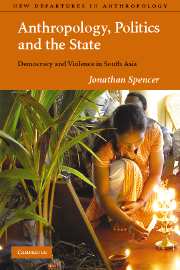Book contents
- Frontmatter
- Contents
- List of illustrations
- Acknowledgements
- 1 The Strange Death of Political Anthropology
- 2 Locating the Political
- 3 Culture, Nation, and Misery
- 4 Performing Democracy
- 5 States and Persons
- 6 The State and Violence
- 7 Pluralism in Theory, Pluralism in Practice
- 8 Politics and Counter-politics
- Bibliography
- Index
1 - The Strange Death of Political Anthropology
Published online by Cambridge University Press: 05 June 2012
- Frontmatter
- Contents
- List of illustrations
- Acknowledgements
- 1 The Strange Death of Political Anthropology
- 2 Locating the Political
- 3 Culture, Nation, and Misery
- 4 Performing Democracy
- 5 States and Persons
- 6 The State and Violence
- 7 Pluralism in Theory, Pluralism in Practice
- 8 Politics and Counter-politics
- Bibliography
- Index
Summary
What happened to the anthropology of politics? A subdiscipline which had seemed moribund in the 1980s has moved back to the centre of anthropological argument. Political themes – nationalism, conflict, citizenship – inflect exciting new work across (and beyond) the disciplinary spectrum. Where have these themes come from and what issues do they raise for anthropology in general? This book seeks to take stock of the recent political turn in anthropology, identifying key themes and common problems, while setting an agenda for work to come. In the pages that follow, I do not argue for any particular theoretical orthodoxy, but instead try to stage a dialogue between critical social and political theory and – anthropology's great strength – equally critical empirical research. The empirical research I concentrate on comes predominantly from one part of the world, South Asia, especially India and Sri Lanka, where particularly fruitful conversations have taken place between activists and intellectuals, and amongst representatives of different academic disciplines – especially history, political theory, and anthropology.
These conversations have taken place in years of upheaval. The critical events in India include the rise of Sikh separatism in the Punjab in the early 1980s, culminating in the assault on the Golden Temple in Amritsar in 1984, followed soon after by the assassination of Indira Gandhi and the wave of anti-Sikh violence which followed it; the destruction of the Babri Masjid mosque in Ayodhya in 1992, and the Hindu–Muslim clashes which followed that; and the rise to national power of the right-wing Hindu Bharatiya Janata Party (BJP).
- Type
- Chapter
- Information
- Anthropology, Politics, and the StateDemocracy and Violence in South Asia, pp. 1 - 18Publisher: Cambridge University PressPrint publication year: 2007



